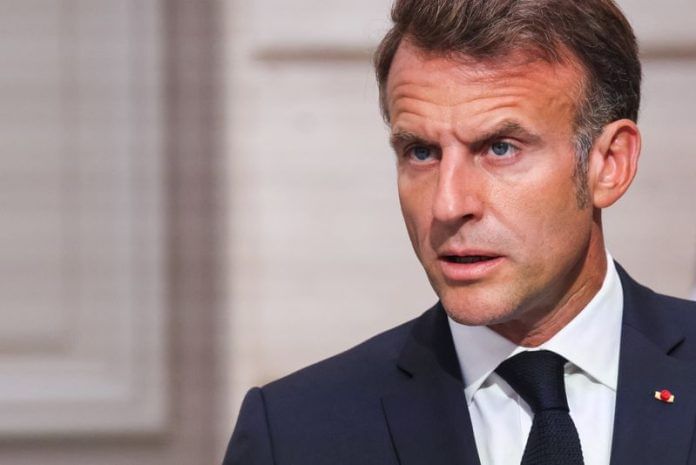By Michel Rose
PARIS (Reuters) -The challenge French President Emmanuel Macron faces in choosing his fifth prime minister in under two years lays bare the depth of a political crisis that in many ways is of his own making, and one with no clear path out.
Francois Bayrou is set to tender his resignation as prime minister on Tuesday, a day after parliament voted to bring down the government over its plans for taming the budget deficit.
Bayrou’s predecessor, Michel Barnier, had suffered the same fate over his fiscal plans only nine months ago.
Fighting for his survival, Bayrou warned lawmakers his downfall would not erase the reality of France’s fiscal largesse. But like the conservative Barnier, he had little protection with no parliamentary majority.
Passing policy through a deeply fractured parliament has become fraught with danger for Macron after a failed bet on a snap election in 2024 weakened his hand.
“There’s no easy way out of here,” said Kevin Arceneaux, director of Sciences Po university’s political research. “The president is really in a difficult position.”
France has rarely suffered a political crisis so deep since the creation in 1958 of the Fifth Republic, the current system of government.
The 1958 constitution was designed to ensure stable governance by creating a powerful and highly centralised president endowed with a strong majority in parliament, and to avoid the instability of the periods immediately before and after World War Two.
Instead, Macron – who in his ascent to power in 2017 reshaped the political landscape – has found himself struggling with a fragmented parliament where the centre no longer holds the balance and the far-right and hard-left hold sway.
France is not used to building coalitions and finding consensus.
IN SEARCH OF SUPPORT
As political opponents rounded on Bayrou before the confidence vote, political analysts said Macron had few cards to play.
The president could appoint another premier from his own ranks. Defence Minister Sébastien Lecornu’s name was among those mentioned as speculation mounted before Monday’s confidence vote. Such a pick would risk appearing tone-deaf and accentuating public discontent.
Some political commentators have said they expect Macron to turn to a Socialist to lead a minority government. But, rather than seeking a stable coalition, the centre-left is pushing for a “non-aggression pact” and the chance to implement its own agenda.
The Socialists are advocating policies to tax the rich and reverse an unpopular increase of the retirement age. Such measures run counter to Macron’s pro-business precepts and undermine past reforms intended to attract foreign investors.
“I don’t believe in the left-wing government scenario,” lawmaker Eric Coquerel, whose hard-left party’s alliance with the Socialists hangs by a thread, told Reuters. “Changing his economic policy, even slightly, is out of the question for Macron.”
POLITICAL WILDCARD
Macron could call another snap election, but opinion polls show Marine Le Pen’s far-right National Rally would strengthen its standing as the biggest single political force in the National Assembly. Macron’s party would lose even more seats.
Le Pen, who is banned from running for office and would lose her seat in a new parliament, has said she is ready to “sacrifice” herself and is urging Macron to trigger an “ultra-fast dissolution.”
The prospect of sharing power with his eurosceptic, nationalist arch-rivals would be a humiliating blow for Macron, making a mockery of his pledge to counter reactionary forces.
Sources close to the president say he is reluctant to call another snap election. “But you can’t rule out anything with him, he is really unpredictable,” cautioned a lawmaker in his party who spoke on condition of anonymity.
Some politicians are calling for a constitutional overhaul and the creation of a Sixth Republic.
But it is unclear how reverting to a more parliamentary system – tried and tested during the chronically-unstable Third and Fourth Republics – would improve France’s governability.
With no constitutional mechanism to force a presidential resignation, Macron is likely to face mounting pressure both inside and outside parliament.
In a country prone to popular uprisings – such as the year-long Yellow Vest crisis of 2018/19 when Macron faced protests over further fuel tax increases – and still reeling from the cost-of-living crunch, discontent is simmering.
In his most recent New Year’s Eve address, Macron floated the idea of referendums. Cornered, he may be tempted to reach for another political wildcard.
In 1969, post-war leader Charles de Gaulle tried the same tactic to regain control after the May 1968 student protests that grew into a nationwide movement.
He lost – and resigned the next day.
(Reporting by Michel Rose, Editing by Richard Lough and Timothy Heritage)
Disclaimer: This report is auto generated from the Reuters news service. ThePrint holds no responsibility for its content.




